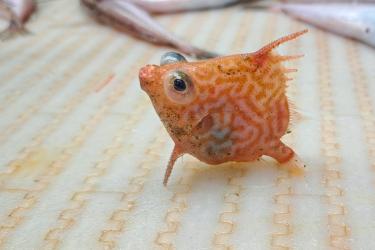NOAA Office of Law Enforcement, the U.S. Fish and Wildlife Service and the Justice Department’s Environmental Crimes Section have been cracking down on the illicit trafficking of protected reef creatures. Two federal law enforcement investigations have resulted in new guilty pleas in Puerto Rico.
The goals of Operation Rock Bottom and Operation Broken Chisel are to protect corals and other reef species native to the Florida Keys and Puerto Rico. The recent cases are being prosecuted by the U.S. Department of Justice’s Environmental Crimes Section along with the U.S. Attorney’s Office for the District of Puerto Rico.
On July 24, Juan Pablo Castro-Torres—a resident of Juncos, Puerto Rico—pleaded guilty to two felony violations of the Lacey Act. He pled to collecting, falsely labeling, and shipping protected marine invertebrate species. His actions were part of an effort to subvert Puerto Rican law designed to protect corals and other reef species.
Illegal Sale of Reef Creatures
In 2015 and 2016 Castro-Torres supplied marine invertebrates, such as Ricordea and zooanthids, to an Arecibo-based aquarium store. The business then sold these corals to customers in the mainland United States and foreign countries for use in high-end saltwater aquariums. It is illegal to commercially harvest Ricordea, zooanthids, and anemones in Puerto Rico.
Castro-Torres personally collected many of the Ricordea and other reinvertebrates that were sold off-island. Because Ricordea are attached to the reef substrate, the defendant would use a chisel to break off the animals. In doing so, he took chunks of the reef with him, which is also illegal and caused habitat damage in addition to removing the individual creatures.
The Arecibo store was run by Aristides Sanchez. Castro-Torres began supplying Sanchez’s business with Ricordea after Puerto Rican law enforcement seized one of Sanchez’s illegal shipments of marine invertebrates in March 2015.
Sanchez pleaded guilty to related Lacey Act violations in August 2017 and is awaiting sentencing.
Castro-Torres will be sentenced at a later date.
Ongoing Operations to Fight Exploitation of Marine Life
The illegal harvesting and sale of marine life resources from the Florida Keys known as Operation Rock Bottom began in 2011. That year, state and federal officers raided a Florida fish-collecting business. The ongoing investigation has led to numerous guilty pleas and federal prison sentences for marine life dealers from the Florida Keys to Idaho.
“Our partnerships are vital to helping ensure the protection and sustainability of living marine resources. This investigation is another great example of how successful partnerships lead to effective results,” said NOAA Office of Law Enforcement Director James Landon. “Investigating those who exploit protected marine life is vital in helping to ensure a healthy ocean.”
